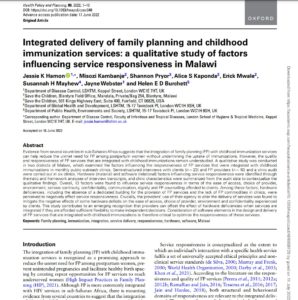
Abstract
Evidence from several countries in sub-Saharan Africa suggests that the integration of family planning (FP) with childhood immunization services can help reduce the unmet need for FP among postpartum women without undermining the uptake of immunizations. However, the quality and responsiveness of FP services that are integrated with childhood immunizations remain understudied. A qualitative study was conducted in two districts of Malawi, which examined the factors influencing the responsiveness of FP services that were integrated with childhood immunizations in monthly public outreach clinics. Semi-structured interviews with clients (n = 23) and FP providers (n = 10) and a clinic audit were carried out in six clinics. Hardware (material) and software (relational) factors influencing service responsiveness were identified through thematic and framework analyses of interview transcripts, and clinic characteristics were summarized from the audit data to contextualize the qualitative findings. Overall, 13 factors were found to influence service responsiveness in terms of the ease of access, choice of provider, environment, service continuity, confidentiality, communication, dignity and FP counselling afforded to clients. Among these factors, hardware deficiencies, including the absence of a dedicated building for the provision of FP services and the lack of FP commodities in clinics, were perceived to negatively affect service responsiveness. Crucially, the providers’ use of their agency to alter the delivery of services was found to mitigate the negative effects of some hardware deficits on the ease of access, choice of provider, environment and confidentiality experienced by clients. This study contributes to an emerging recognition that providers can offset the effect of hardware deficiencies when services are integrated if they are afforded sufficient flexibility to make independent decisions. Consideration of software elements in the design and delivery of FP services that are integrated with childhood immunizations is therefore critical to optimize the responsiveness of these services.
Key messages
- According to FP clients and providers, hardware deficiencies, such as the absence of a suitable building, inappropriate service structure and insufficient commodities, undermine the responsiveness experienced by clients utilizing FP services that are integrated with childhood immunizations in routine outreach clinics. This is concerning because the responsiveness of services is critical to the uptake and continuous use of contraceptives given the sensitive and repeat nature of FP services.
- Crucially, FP providers can mitigate the negative effect of some hardware deficits by applying their agency to alter the delivery of services so long as the hardware in question does not relate to providers themselves (e.g. staffing shortages or knowledge gaps). Consideration of software elements such as the providers’ agency in the design and delivery of integrated FP services is therefore pivotal to the responsiveness of services.
- Programme designers and implementers looking to improve the responsiveness of FP services that are integrated with childhood immunizations should not only create the conditions under which providers can apply their agency to pragmatically deliver services but should also provide the tools for them to adapt services in a way that ensures clients’ legitimate expectations are met. However, it is equally paramount to address hardware gaps so that providers’ efforts are not dominated by attempts to mitigate the negative effects of these deficiencies.
Conclusions
The study investigated the factors influencing the responsiveness of FP services that were integrated with childhood immunizations in routine outreach clinics by examining the perceptions of clients and providers. Findings revealed that hardware factors, including the non-static nature of the clinics characterized by the absence of a dedicated and private space for the delivery of services, undermined the responsiveness experienced by clients. However, crucially, providers can mitigate the negative effect of such hardware deficiencies by
applying their agency to alter service delivery. Consideration of software elements in the design and delivery of integrated FP services is therefore critical to optimize the responsiveness of these services.